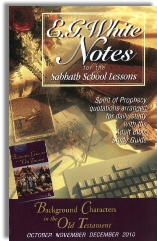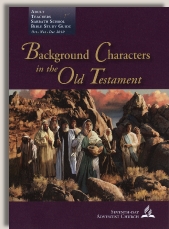|
||||||||||||||
Commentary on "Story and History"
Day 2: Sunday, September 26, 2010 - People and Plots
Overview
Today's lesson refers to the story of Job and the story of Huldah. It makes the point that the story of Job has a two-dimensional plot: the earthly and the heavenly plots. It also tells us that Huldah is a minor character in the story of the discovery of the book of the Law during the reign of King Josiah. Her information is sparse but specific. The lesson closes with these questions: "What is your plot? what kind of character are you? If you story was written as a Bible narrative, how might it read in contrast to how it ought to read?
Observations
The fact that we can see both the "heavenly plot" and the "earthly plot" in the book of Job is not the main point of the book. As an Adventist, I understood this dual insight to be the point of the book of Job: we can't see the ways Satan is interacting with Jesus in an effort to harm us.
This fact, however, is not the essential point, although it is a helpful insight. The real point of the book is found at the very end, where God talks to Job and Job repents.
In Job 38 through 41 God questions Job and points out that Job has absolutely no power or understanding to control or explain creation. Job, in other words, cannot understand the "why" or the "how" of the events of his life. Only God can see the whole of reality—and Job is expected to trust God without seeing or knowing—simply because He is God.
In chapter 42 we find the climax of the book. Job, the righteous man who really did honor God, repents in sackcloth and ashes. In other words, even those who are punctilious in their doing good and in attempting to honor God must repent.
Job admitted,
"I I know that You can do all things, and that no purpose of Yours can be thwarted. 'Who is this that hides counsel without knowledge?' Therefore I have declared that which I did not understand, things too wonderful for me, which I did not know." 'Hear, now, and I will speak; I will ask You, and You instruct me.' "I have heard of You by the hearing of the ear; but now my eye sees you; Therefore I retract, And I repent in dust and ashes." (Job 42:2-6).
Here is the point of the Job story: God is sovereign. Job never knew what was happening in the spiritual realm. God restored his fortunes to him, even giving him another ten children—but Job did not get back the ten children who died.
Because God has revealed the "back story" to us, we see more clearly what the issues were surrounding Job…but Job never knew. Nevertheless, Job wasn't SUPPOSED to understand. He was expected to trust God and to cease trying to explain God's ways and purposes. He was supposed to trust God no matter what happened—not blindly, not fatalistically, but because of the faithfulness of God's promises and sovereign goodness.
We, like Job, are not to question God or explain "how" He works. We are to trust Him, and we are to repent of our arrogance that assumes we have a right either to understand God's ways or to criticize His actions. We are not supposed to know the "back story". We are to trust God and admit we do not have the right or the ability to understand His purposes and ways.
Like righteous Job, we must repent and let God be God.
Hulda
Similarly, the mention of Huldah in 2 Kings 22 is not primarily about Huldah. The point of that story is that Josiah listened to Shaphan the scribe read the book of the law to him after Hikliah the high priest found it. Josiah was grief-stricken as he realized how far from God's ways the nation had strayed, and he commanded that the high priest and a handful of other men inquire of the Lord regarding what they ought to do.
For unknown reasons the men consulted Huldah instead of Jeremiah or Zephaniah—perhaps because she was right there un Jerusalem. Huldah delivered God's words and prophesied that God would punish the people for their apostasy, but because Josiah's heart was tender toward the Lord and had repented, God would have mercy on him and gather him to his fathers when he died instead of punishing him.
The story, again, is a story of God's word being unchangeable and consistent, a give reality which human can and must believe and trust.
The lesson makes not reference to the reliability of God's promises and God's word, and instead it focusses on Huldah as a literary example of a minor character. Minor characters, however, are useless outside of a context and purpose. The purpose of Huldah's story is to show that God reveals His will, and God's righteousness demands obedience. God has mercy on those whose hearts are tender toward Him; He punishes those who harden their hearts.
Summary
- The point of the story of Job is that he, a righteous man, had to repent before God. He was not able to stand before God and expect Him to explain Himself or to vindicate Job.
- Job had to admit he had no understanding of God's ways and that he had spoken of things he didn't understand.
- God does not owe us explanations or an understanding of the "back story". Like Job, we must trust God because He is God and His promises are true and faithful.
- Huldah delivered the word of God: He would punish Israel for her idolatry, but He would have mercy on King Josiah because He had a tender heart toward God.
- Minor characters are pointless apart from their function and the revelation of God's purposes.
- Both Job and Hulda reveal that God uses man to accomplish His purposes. Never do we use God to vindicate ourselves.
- We are not to expect God's mercy or His inside information. We are to allow Him to make us new, and then we are to trust Him and obey.
Copyright 2010 BibleStudiesForAdventists.com. All rights reserved. Revised September 23, 2010. This website is published by Life Assurance Ministries, Glendale, Arizona, USA, the publisher of Proclamation! Magazine. Contact email: BibleStudiesForAdventists@gmail.com.
The Sabbath School Bible Study Guide and the corresponding E.G. White Notes are published by Pacific Press Publishing Association, which is owned and operated by the Seventh-day Adventist church. The current quarter's editions are pictured above.
Official Adventist Resources
Standard Edition Study Guide Week 1
Teacher's Edition Study Guide Week 1
Easy Reading Edition Study Guide Wk 1
Search the Complete Published Ellen G. White Writings


